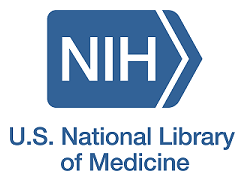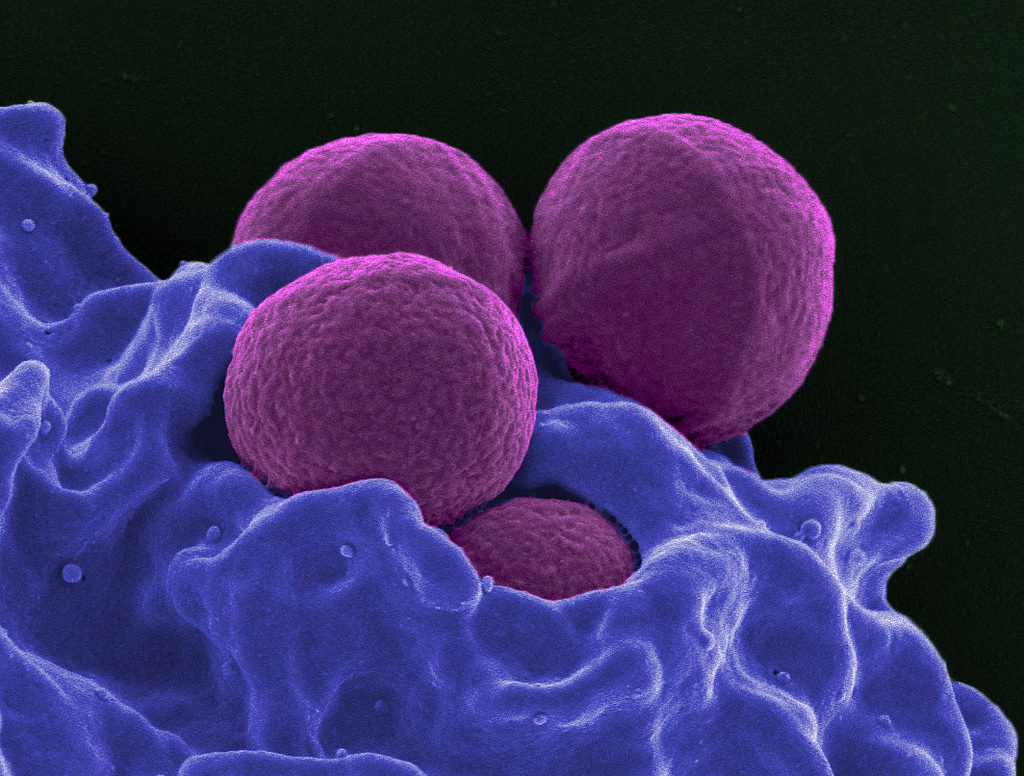

To Your Health: NLM update Transcript
Superbug in space: 03/13/2017

Image: Courtesy of the National Institute of Allergy and Infectious Diseases (NIAID)/Flickr
Greetings from the National Library of Medicine and MedlinePlus.gov
Regards to all our listeners!
I'm Rob Logan, Ph.D., senior staff, U.S. National Library of Medicine (NLM).
Here is what's new this week in To Your Health - a consumer health oriented podcast from NLM - that helps you use MedlinePlus to follow up on weekly topics.
While the recent SpaceX Falcon 9 rocket launch was memorable, its cargo includes an antibiotic-resistant superbug to be studied on the International Space Station (about 250 miles above earth).
The MRSA superbug resists many earth-found antibiotics, which MedlinePlus.gov's MRSA health topic page explains presents a serious challenge to preventing infections in U.S. hospitals and clinics. MRSA is associated with diverse health problems such as pneumonia, as well as skin and blood infections. In addition to MRSA, The World Health Organization recently listed 11 other antibiotic resistant superbugs. Akin to the fictional impact of kryptonite on Superman, MRSA is among the nasty superbugs to men, women, and children that earthling scientists need to better understand.
The U.S. National Aeronautics and Space Administration (or NASA) included the superbug among its current array of scientific experiments in order to assess how MRSA adapts without gravity.
In the International Space Station's zero-gravity environment, its six current astronauts hope to evaluate how MRSA (that is sometimes called staph) mutates and grows, which is a key to deterring its paradoxically-named superbug abilities. In other words, the astronauts' tests are designed to yield insights about how and why MRSA resists antibiotics on earth.
In a news conference before the launch, the project's lead researcher explained (and we quote): "I have this hypothesis that microgravity will accelerate the mutation patterns. If we can use microgravity as an accelerator to fast-forward and get a sneak preview of what these mutations will look like, then we can essentially build smarter drugs on Earth' (end of quote).
NASA explains the space station's zero gravity causes significant stress to bacteria, which is why scientists believe MRSA's threatening environment will compel the bacteria to adapt and, by doing so, reveal some of its future biological paths. The environment, then, becomes a time accelerator that helps scientists anticipate how MRSA biologically evolves.
We should explain the International Space Station is used frequently as an orbiting scientific lab partially because of its zero gravity -- as well as the talents of its highly trained, on-board astronauts. Among the reasons for the lab's success is its unique extraterrestrial conditions (that include radiation exposure) foster bacterial adaptions, mutations, and other changes that preview changes and challenges for physicians and patients in the future.
To protect the astronauts' health, the superbug will be sealed with three levels of containment within a portable habitat.
Meanwhile back on earth, the Mayo Foundation for Medical Education and Research provides a helpful introduction to the impact of a MRSA infection within the 'start here' section of MedlinePlus.gov's MRSA health topic page.
The National Institute of Allergy and Infectious Diseases explains how MRSA is treated within the 'treatment and therapies' section of MedlinePlus.gov's MRSA topic page.
The U.S. Centers for Disease Control and Prevention provides general information about the impact of MRSA in health care, community, and workplace settings within the 'specifics' section of MedlinePlus.gov's MRSA health topic page.
MedlinePlus.gov's MRSA health topic page additionally provides links to the latest pertinent journal research articles, which are available in the 'journal articles' section. Links to relevant clinical trials that may be occurring in your area are available within the 'clinical trials' section. You can sign up to receive updates about MRSA as they become available on MedlinePlus.gov.
To find MedlinePlus.gov's MRSA health topic page, please type 'M...R...S...A' in the search box on MedlinePlus.gov's home page, then, click on 'MRSA (National Library of Medicine).' MedlinePlus.gov additionally has health topic pages on antibiotic resistance, bacterial infections, and infection control.
Otherwise, I hope you find space medicine as interesting as we do. Outer space is a surprisingly practical place to investigate some challenging health problems on earth.
Before I go, this reminder... MedlinePlus.gov is authoritative. It's free. We do not accept advertising .... and it is written to help you.
To find MedlinePlus.gov, just type 'MedlinePlus.gov' in any web browser, such as Firefox, Safari, Chrome, or Explorer, on any platform.
We encourage you to use MedlinePlus and please recommend it to your friends. MedlinePlus is available in English and Spanish. Some medical information is available in 48 other languages.
A written transcript of recent podcasts is available by typing 'To your health' in the search box on MedlinePlus.gov's home page.
The National Library of Medicine is one of 27 institutes and centers within the National Institutes of Health. The National Institutes of Health is part of the U.S. Department of Health and Human Services.
A disclaimer — the information presented in this program should not replace the medical advice of your physician. You should not use this information to diagnose or treat any disease without first consulting with your physician or other health care provider.
It was nice to be with you! Please join us here next week and here's to your health!





















.png)












No hay comentarios:
Publicar un comentario